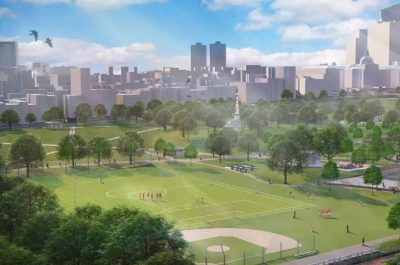Mayor Michelle Wu announced the Boston Common Master Plan on Oct. 12, detailing upcoming improvements to the public space and inviting residents to share their thoughts during a 45-day open comment period.

The master plan was a collaboration between the Boston Parks and Recreation Department and the Friends of the Public Garden, along with Weston & Sampson design studio. The City of Boston set aside $28 million in 2019 to upgrade the Boston Common, part of the $153 million that came from the 2017 sale of the Winthrop Square garage.
When the master plan was announced, Mariama White-Hammond, Boston’s chief of environment, energy and open space, said the plan could take five to seven years.
According to the BCMP report, the City will add a new multipurpose soccer field, two basketball courts and a dog recreation area.
The plan’s five listed goals include supporting diversity, strengthening the park’s character, expanding amenities, improving safety and maintenance and improving the park’s physical infrastructure.
The plan lists several areas in which the Common could improve as the park lacks strong Wi-Fi, a consistent event-planning strategy and a modern electrical system.
Lauren Colodny, a 2021 Wellesley graduate, said they are excited to see what the city ends up doing, even though they are hesitant about large-scale city government spending.
“As it is right now, it’s a nice place, but it doesn’t really offer much in terms of activity and actual services,” Colodny said. “I think having actual programs and facilities for people to use would be a great thing.”
Joan Fitzgerald, professor of public policy and urban affairs at Northeastern University, wrote in an email that the new Martin Luther King memorial on the Common, which is set to be unveiled in 2023, will accentuate the Common’s sites.
“The enclosed dog park and upgrades to the sports fields are sorely needed. With the new MLK sculpture and all the added features and upgrades, the new Boston Common will be a real gem to complement the Public Garden,” Fitzgerald said.
According to a BCMP report, a wide range of visual and structural reforms will also be introduced to the Common including planting trees, adding an outdoor dining area and rearranging athletic spaces.
Elliot Laffer, chair of the Neighborhood Association of Back Bay, said he had “great faith” in those involved with the project.
“It’s a relatively small space … and the uses have changed over the years,” Laffer said. “So, like any space that’s heavily used and heavily loved, it needs to be kept up to date.”
Laffer said one of the things the Common needs is additional bathrooms. The plan specified there would be new restrooms installed across the park to address frequent “crowd control” at the current limited number of bathroom stalls.
The plan also acknowledged the park’s current lack of accessibility, saying it would institute direct pathways from entrances to key park facilities, involving multiple ramps and an accessible route between the nearby MBTA stations.
“I think parts of the Common are more accessible than others, but it seems like a lot of the outdoor space is not very accessible for ADA needs,” Colodny said.
Liz Vizza, president of Friends of the Public Garden, wrote in an email, “this is a park that belongs to the entire city, if not the world, which is why we need it to be the best version of itself to welcome residents and visitors for generations to come.”
The Boston Common Master Plan is currently holding a public comment period until Nov. 30. Comments can be submitted at the bottom of the Master Plan website.


















































































































